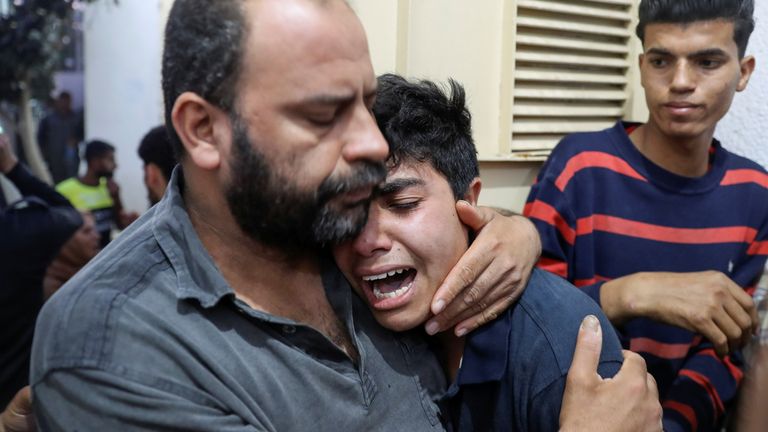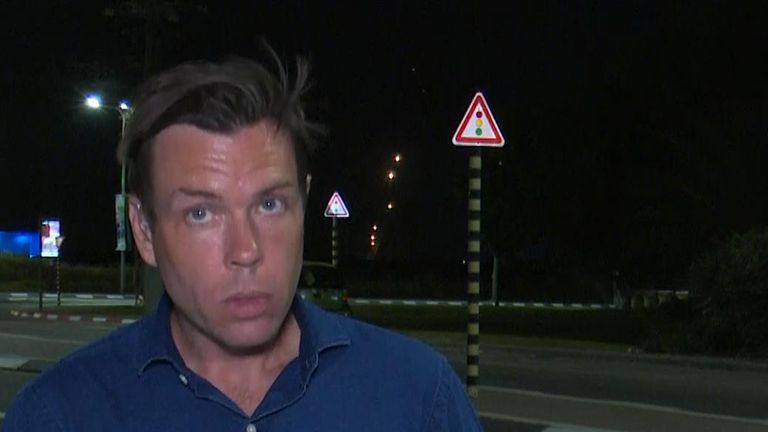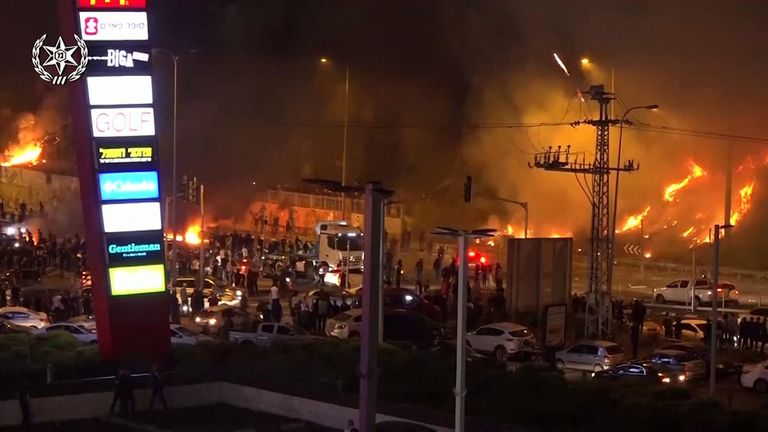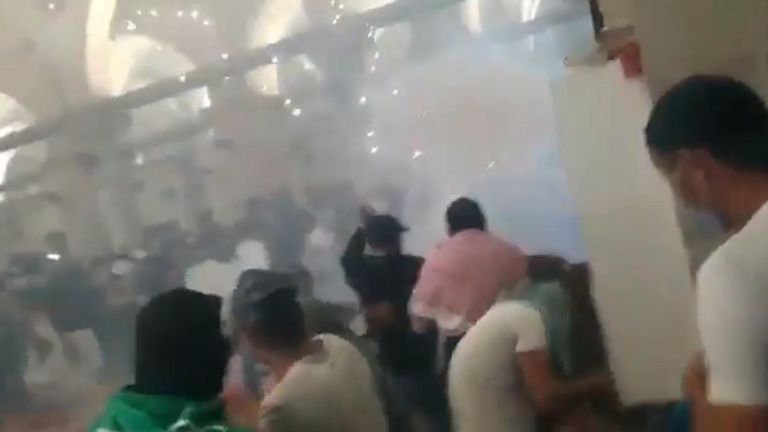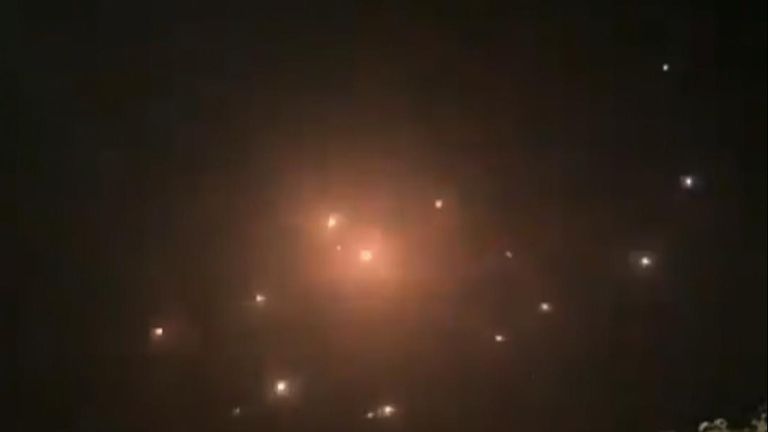Israel-Gaza violence: Death toll rises as UN envoy warns of 'heading to full-scale war'
Israel's Prime Minister Benjamin Netanyahu insists Hamas should "pay a very heavy price for their belligerence".
Wednesday 12 May 2021 18:58, UK
Barrages of rockets have streamed out of Gaza while Israeli jets pounded the territory in return, in the most severe outbreak of violence since the 2014 war.
Several of the rockets fired by Hamas militants in Gaza struck Israel's largest city Tel Aviv overnight.
The Israeli military says a thousand Hamas rockets have been fired at a number of Israeli towns and cities since Monday - part of a cycle of violence which has developed fast.
The Hamas rocket fire has, at times, overwhelmed Israel's missile defences, causing air raid sirens and explosions to echo across Tel Aviv, and other cities.
At least 56 people have been killed in Gaza including 14 children, and six in Israel. At least 335 have been wounded, according to the Palestinian Ministry of Health.
Meanwhile Israeli airstrikes have flattened two apartment towers in the Gaza Strip, where two million Palestinians have lived under a crippling Israeli-Egyptian blockade since Hamas took power in 2007.
The Israeli military insists it was used as a Hamas operations and intelligence centre.
On Wednesday Hamas confirmed Israeli reports that one of its senior operatives - the brigade commander for Gaza City - had been killed. Israeli security service Shin Bet said he among 16 military targets who died.
Elsewhere, rioting and civil unrest has broken out.
The UN Middle East envoy Tor Wennesland warned the situation was "escalating towards a full-scale war".
But Israel's Prime Minister Benjamin Netanyahu insisted Hamas should "pay a very heavy price for their belligerence".
The Israeli military, which has named its offensive on Gaza "Operation Guardian of the Walls", says it will continue to strike the enclave hard from the air with jets, attack helicopters and drones.
The navy is also targeting the strip from the sea, in an operation it says does everything possible to minimise civilian casualties.
What the Israeli Defence Force and Hamas have to say:
Spokesman Lieutenant Colonel Jonathan Conricus told Sky News a rocket unit of the Palestinian Islamic Jihad group was hit; a commander of an anti-tank missile unit of Hamas was killed and senior operatives from Hamas military intelligence department were killed, as was a Commander of its Gaza City Brigade and Khan Yunis Brigade.
The Israeli military claims that of the around 1,000 Hamas rockets fired from Gaza, 850 landed in Israel or were intercepted but 200 didn't make it across the border and landed in Gaza.
Hamas commanders have not responded to the allegations that some of its own rockets may have misfired and caused Palestinian deaths.
They instead talked of "the honourable scene" of bombarding the city of Tel Aviv - their specific target along with its international airport - describing it as "the biggest achievement in this battle".
Its spokesperson Fawzi Barhoum said: "While the Israeli occupation has decided to launch a new war against Gaza, the Palestinian resistance led by Al Qassqm Brigades is determined to act in response and has the right to defend the Palestinian people.
"Today, we declared that the resistance will act in self-defence against any Israeli violation, crime or atrocity.
"We deem the bombing of Tel Aviv as the biggest achievement in this battle."
In a spiral of violence which is escalating fast there are developments on several fronts with:
• 56 dead in Gaza including 14 children and six dead in Israel. At least 335 have been wounded
• the collapse of a residential tower block in Gaza
• five civilians dead in Israel and more than 200 wounded.
• An Israeli solider was killed in rocket attack, according to the Israeli army.
What is happening elsewhere?
As well as airstrikes, in another an alarming development rioting and civil unrest broke out overnight in several "mixed" Israeli cities.
These are cities within Israel (rather than the West Bank) where Israeli Jews live alongside Israeli Arabs.
In a number of towns including Acre, Nasareth and Lod, Israeli Arabs protested in support of Palestinians who are considered under international law to be occupied by Israel.
The unrest, which prompted a state of emergency to be declared in Lod to the east of Tel Aviv, represents a new schism and a challenge for the Israeli government to contain.
For Hamas, it plays into the casting of themselves as the protectors of the Palestinians.
Hamas spokesman Mr Barhoum said: "The Palestinians' in-street celebrations of bombing Tel Aviv across Palestine is a clear declaration of victory and indicates their awareness of successful resistance operations in response to Israeli atrocities."
The international response:
The heaviest fighting between the two enemies since 2014 has caused global alarm with the US, the EU and the UK all calling for restraint by Israel, while at the same time, saying it has the right to defend itself.
All are demanding that Hamas immediately stop its rocket attacks.
Prime Minister Boris Johnson said on Wednesday that the UK was "deeply concerned by the growing violence and
civilian casualties" and he urged an "urgent de-escalation of tensions".
But behind the international rhetoric, there is no effective diplomatic strategy to stop the cycle.
And with Israel and the Palestinian West Bank both in disarray, any contact between the two sides has broken down.
How the situation re-ignited:
The violence began last weekend at the Al Aqsa mosque, the third-holiest site in Islam and the holiest site in Judaism.
In a highly provocative move Israeli police entered the mosque and threw stun grenades inside.
Palestinians were also angry at an Israeli police decision, at the start of Ramadan, to barricade the seating area outside Jerusalem's Damascus Gate.
That violence followed many months of ever-increasing frustration by Palestinians, with Jewish settlers expanding at unprecedented levels into the occupied West Bank and East Jerusalem.
There is also the issue of Sheikh Jarrah, the East Jerusalem neighbourhood where Palestinian families are fighting a court battle with Jewish settlers who want to take their homes, claiming the land is historically theirs.
And last month, Human Rights Watch released a major report accusing Israel of a process of apartheid over the Palestinians.
Israel captured East Jerusalem in 1967 and annexed it as their own, but most of the international community considers it to be occupied land.
In a culmination of all recent events, on Monday evening Hamas began firing rockets from Gaza towards Jerusalem and the conflict escalated rapidly.

